YBRECA project 2015-2017
Schulpartnerschaftsprojekt YBRECA
Youth Bridges To Reach Efficient European Citizenship Awareness
"The European Commission support for the production of this publication does not constitute an endorsement of the contents which reflects the views only of the authors, and the Commission cannot be held responsible for any use which may be made of the information contained therein."
Teilnehmer?
2015/16 Klassen 11BIW und 11BIT der Höheren Berufsfachschule
2016/17 Klassen 11BIW der Höheren Berufsfachschule und 11BG2E des Beruflichen Gymnasiums
Inhalt?
YBRECA is an Erasmus+ project – Strategic Partnership - which was launched on 1st September 2015. The project consortium comprises of high-schools from Romania (Lead Partner), UK, Germany, Italy, Sweden, Greece and Turkey.... The project addresses the young generation, in pragmatic terms, so that they become active European citizens who take advantage of all the European opportunities, on one side, and make positive social changes, on the other side. Intercultural communication among students and among teachers all over Europe is on focus, in order to make it a better place to live in, to develop and to reach success. Motto: Think European while making your national traditions famous in Europe! Visit us on facebook.
Firtst impressions of the students?
The Europe-wide Erasmus+ project, „YBRECA“ (Youth Bridges To Reach Efficient European Citizenship Awareness), that launched on September 1st 2015, caused here, in the classes 11BI1W and 11BI1T of the Landrat Gruber Schule in Dieburg, excitement as well. At the moment all students are busy preparing creative, by the students chosen, tasks, to leave a good impression at the other participating countries. For example they created timelines of the theme “How did Germany join the EU”, articles of the german-french relationship and a fantasy-interview, in which they asked Konrad Adenauer questions about the EU. The visit of other country’s participants is already being awaited, for which the students created creative poster walls, as well as funny little things, like for example a German dictionary, often used German lines and tongue-twisters with translations. At this point the students don’t know much about the continuation of the project, but Mr. Grote and Mr. Tschuschke, who lead the German project parts together and also visit participating schools of other countries, let the students know that they will get the opportunity to communicate with students of other participating countries. Whatever comes next, we, the students of the Landrat-Gruber-Schule, are looking forward to future collaboration of the Erasmus+ project and communications with students from the EU.
Tim and Dennis
Zwischenergebnisse?
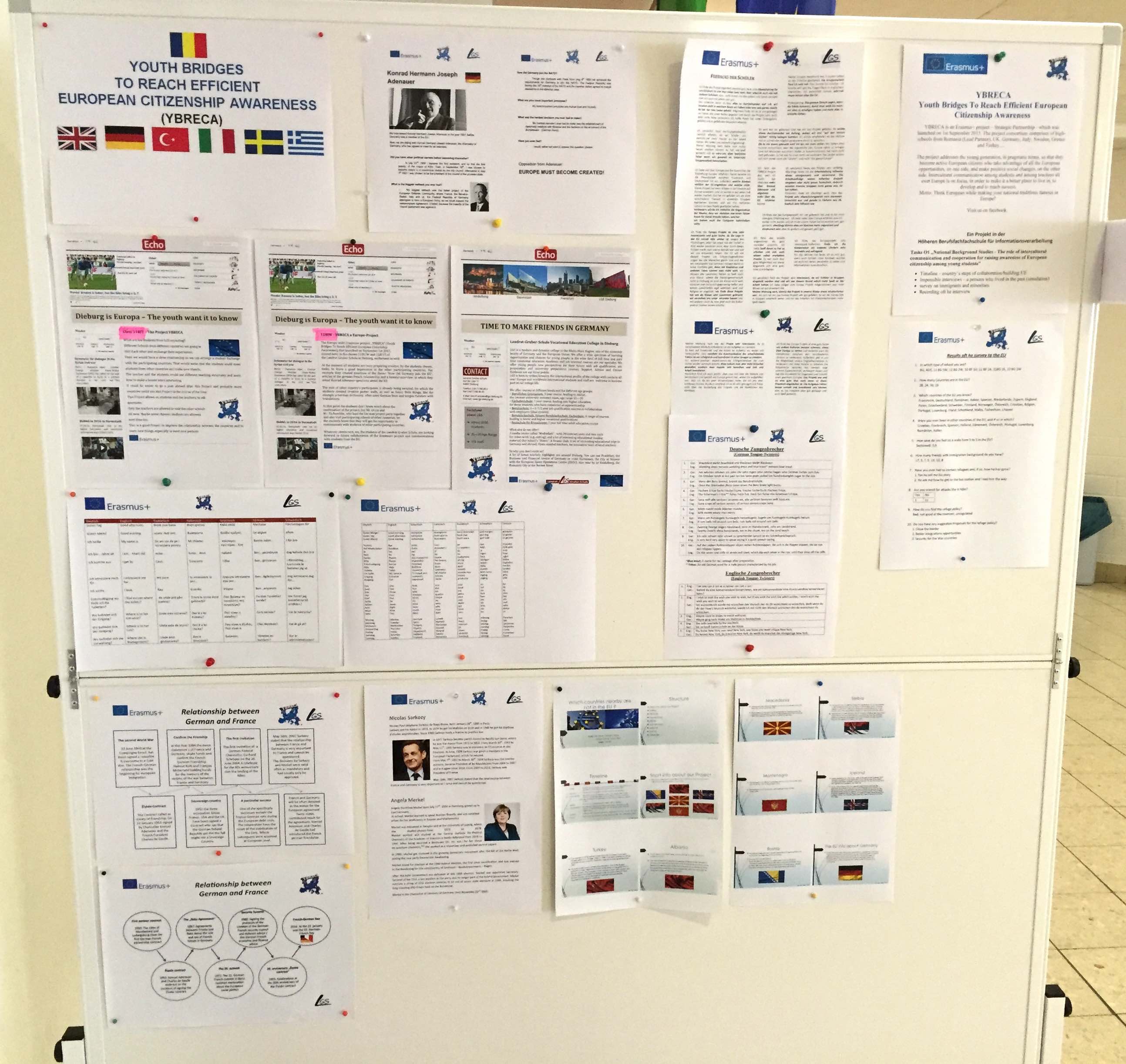
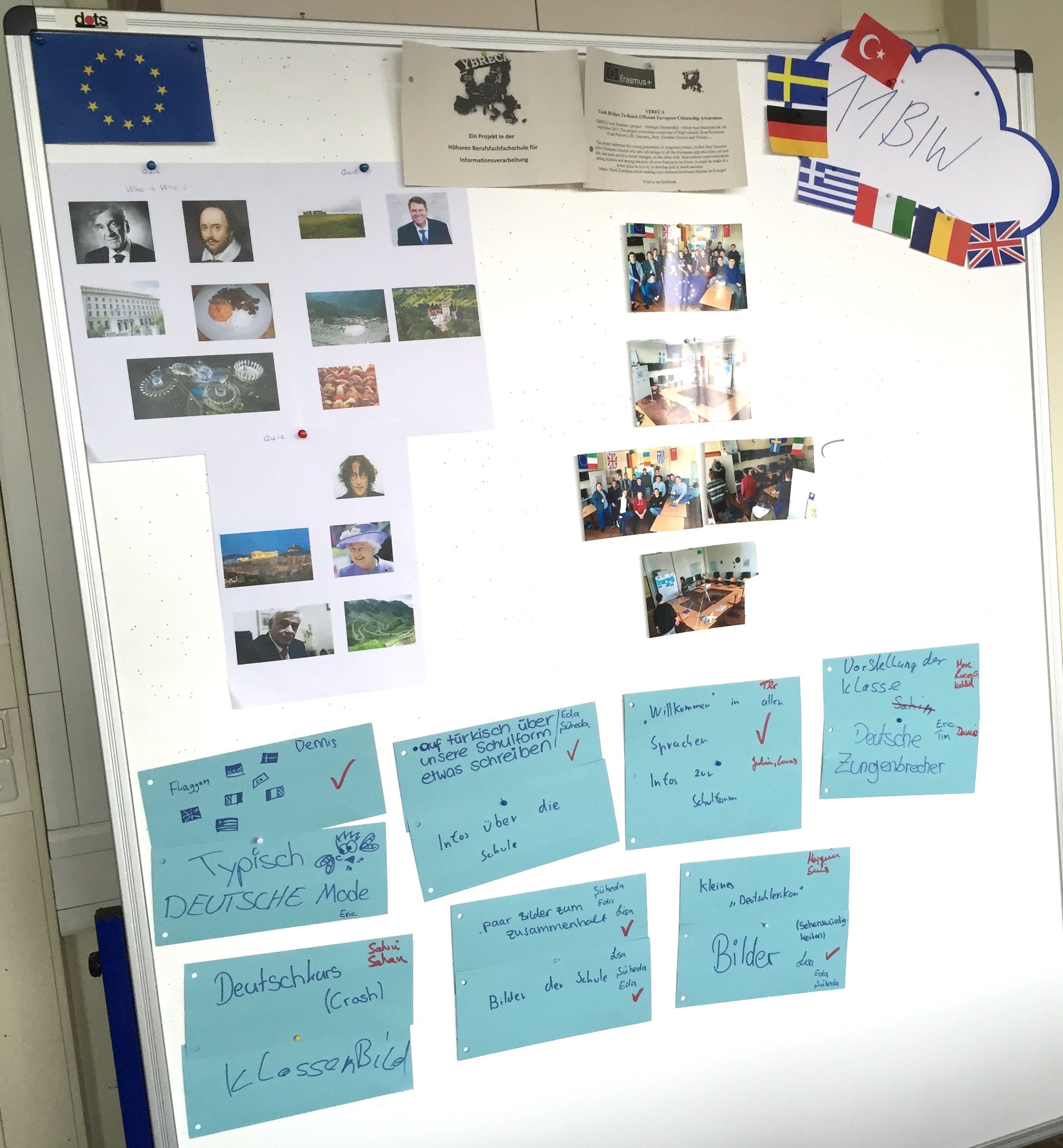
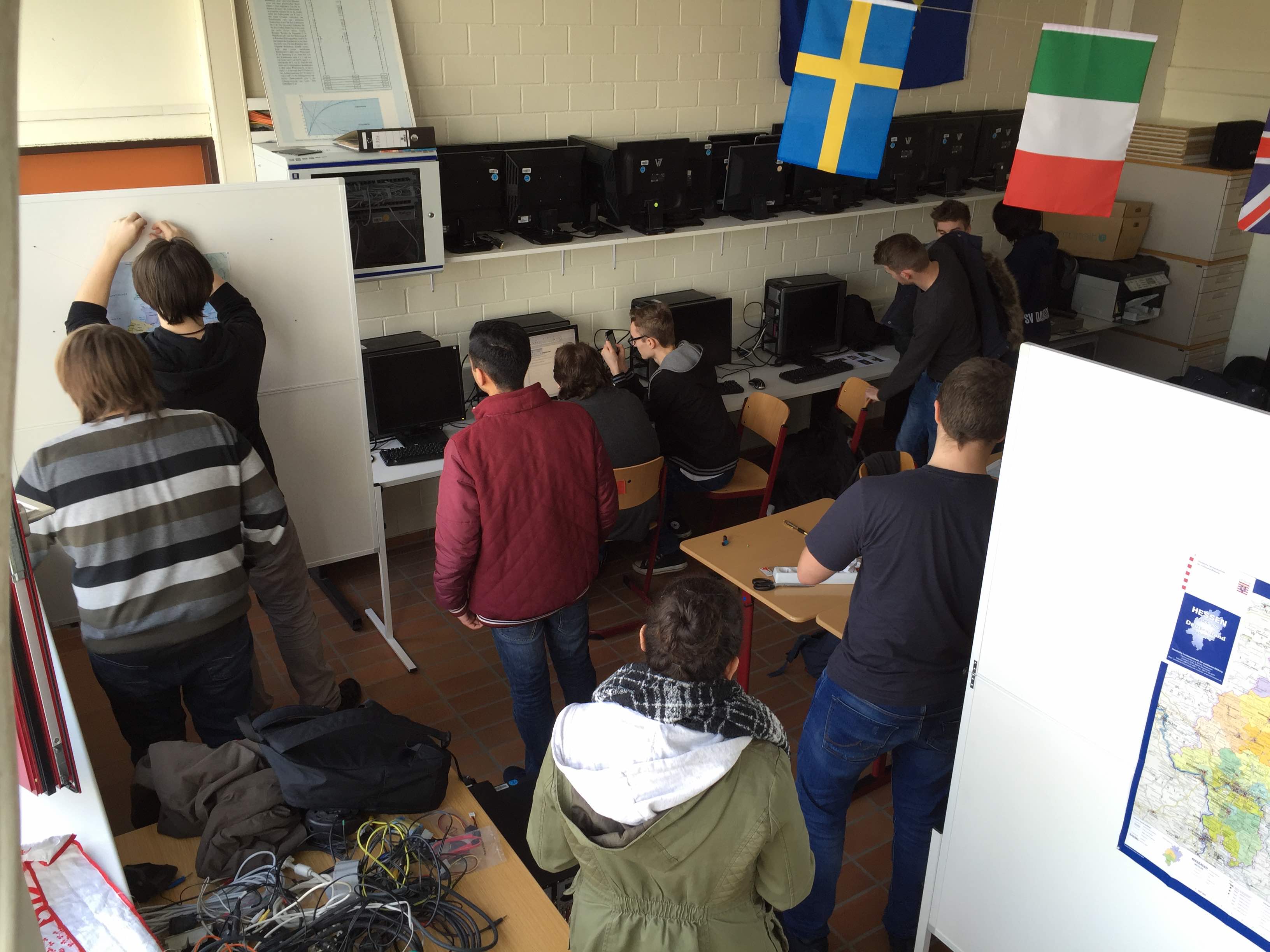
Ausflug nach Straßburg?
Our trip to Strasbourg [was] a part of the politic and economy [lesson]. [My] first impressions of the city were quite good. I didn’t expect it to be that modern and old-style at the same time but it turned out beautiful. [...] The first point of interest was the beautiful Cathedral “Notre Dame de Strasbourg” or “Münster”. From there we did some sight seen on our own and visited the “Place Kleber” and the “Rue des Moulins”. The city of Strasbourg is full of tourists although it isn’t a capital city but the beauty of the buildings and the French-German flair speak for itself. [...]
After that, we all met at the bus stop again from where we drove to the “European district” which got its name because of the European Parliament and our destination, the Council of Europe. The Council of Europe is an institution which is responsible in first place for human rights, democracy and respect.[...] The Secretary General of the European Council is Thorbjørn Jagland. He was also the chairman of the Norwegian Nobel Committee and the prime minister of Norway. [...]
In front of the building are the flags of the countries of the European Council which are ordered by name. It has 47 member states [...]. But why are the most of the European institutions in Strasbourg? The guide told us that the reason for that is because of the location. It is located in the central of Europe, almost on the boundary between France and Germany. That’s why many people call Strasbourg as the “capital of Europe”. [The flag] has twelve stars on it which are ordered in circle. The number twelve is a “perfect” number according to the statement of the guide. [We got many other informations, I can't tell in a short way.]
Then we got ourselves a guide to show us more of the city and to tell us something about the history of Strasbourg. Strasbourg was built by two countries together, Germany and France who brought their culture and architecture to the city. At the end of the day, we learned a lot about the meaning of the European Council and the European institutions and we really had a great time.
Adrijan und Zvonimir
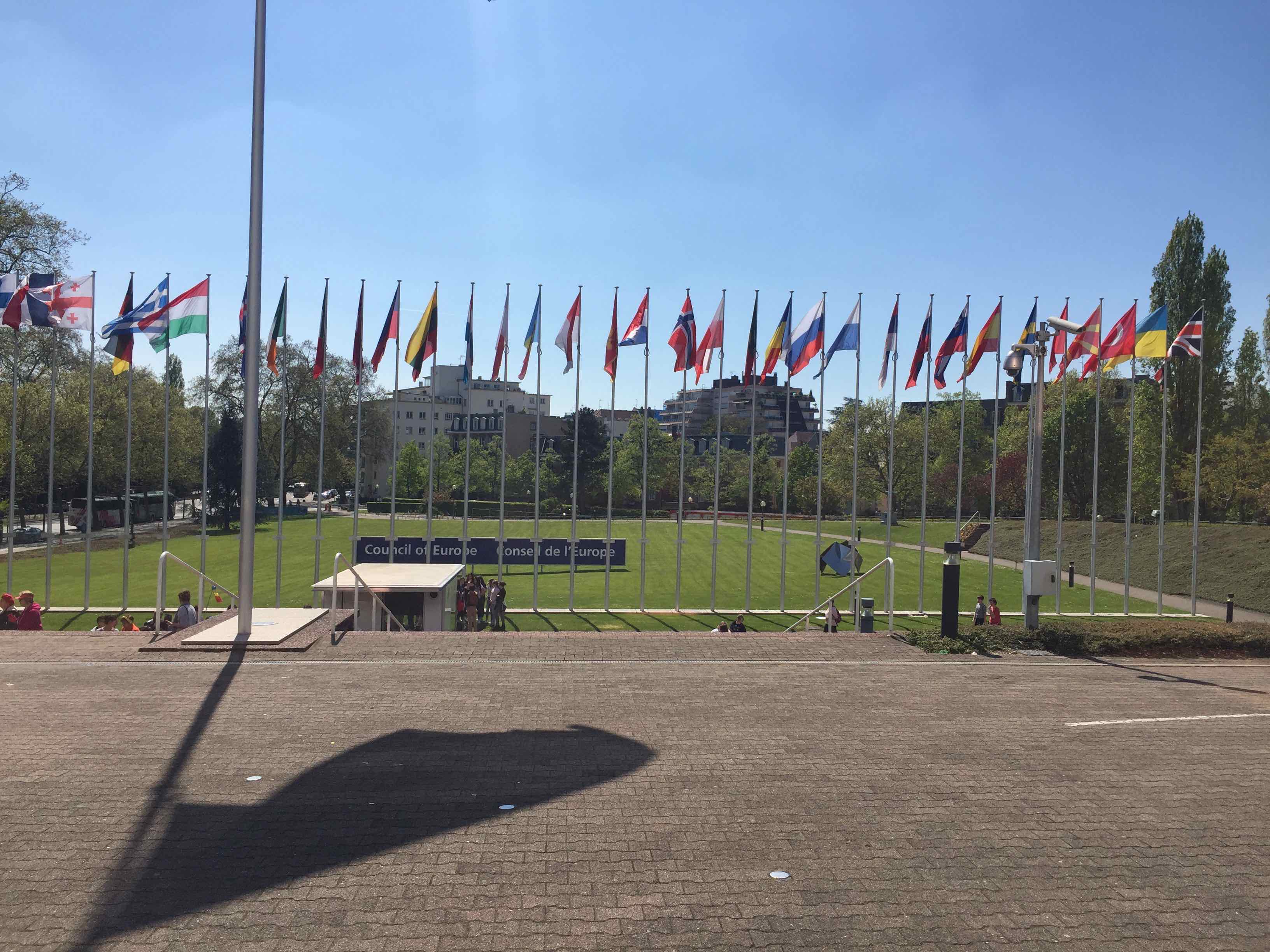
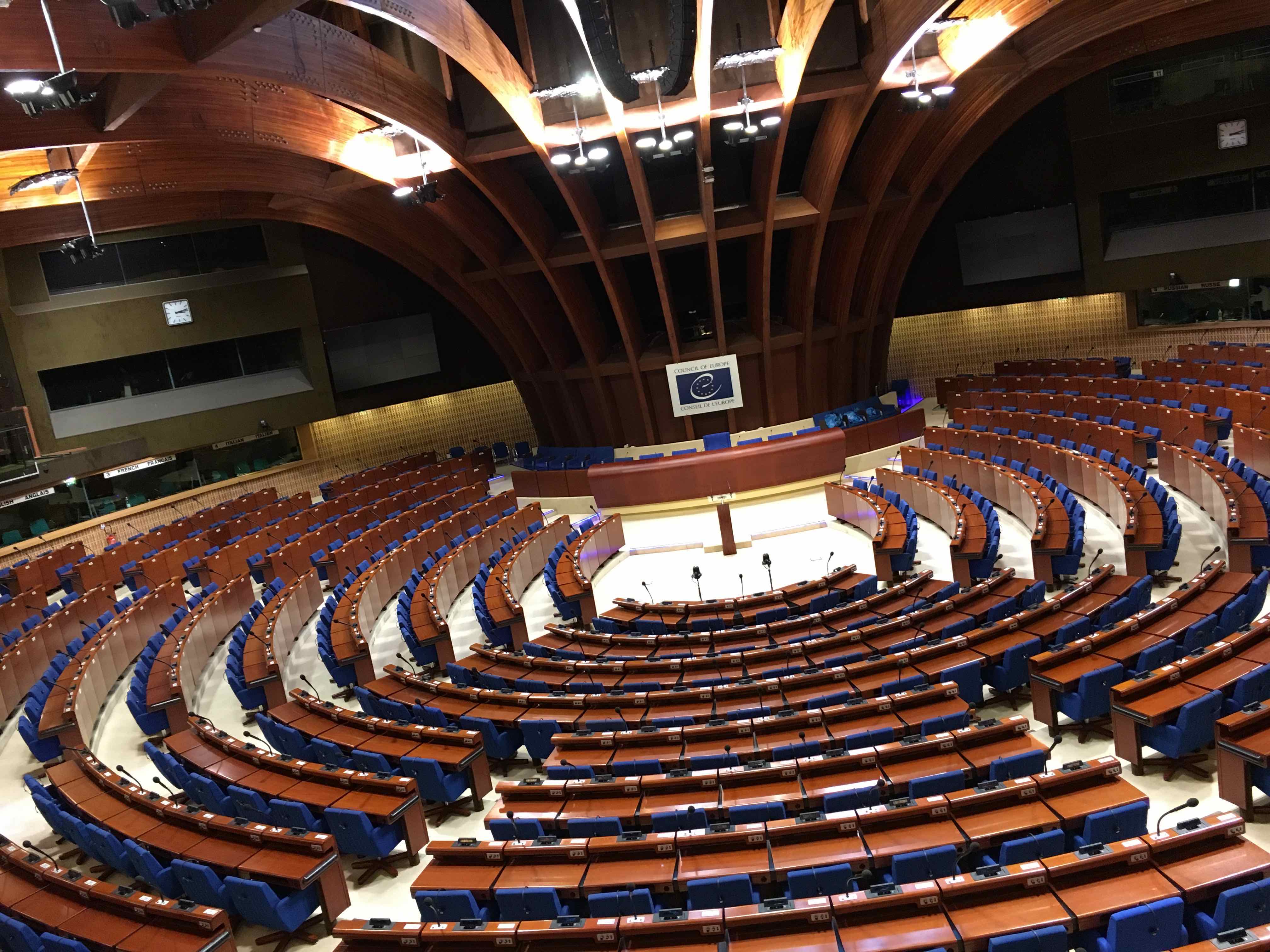
What happens with the EU?
Since Great-Britain left the EU with their Brexit, which is also called Britain Exit, they had a big influence on Germany and Europe overall. The European Union is losing with Great-Britain the second biggest national economy, the financial capital of the world and a country with the 3rd biggest population. But what exactly does the Brexit do to Germany? First of all, Germany is now even more under suspicion to conquer Europe and the only thing Merkel, the German president, said, that he can’t see any ways to reverse the Brexit.
The exit Britain’s will have serious economic consequences with around 300 billion Euro, because Great-Britain is one of our most important export markets and over 2.500 German companies established there. The German automobile industry, mechanical engineering and the chemical sector will be influenced the most and the stock market has also his problems with the Brexit: the DAX and the value of the Pound is significantly falling. But there will also be a profit for the chemical industry, because they could increase their competitiveness worldwide. The Germans will also lose a very important political vote, because the Brits have always had the same opinion in taxation, finances or subsidies. But what we are fearing the most is that Britain has only been a domino and other countries will follow leaving the EU.
According to a survey by “Stern.de” 62% of the Germans are against the Brexit. There has also been the question if Germany should also leave the EU but according to a survey by “Stern.de” 79% have been against it and they also questioned if the EU still has a future and 63% voted for yes. What will really happen is not pretty clearly yet, since everything happened a few days ago but experts are guessing that the impact will first be visible in 2030.
Marcel, Julien, Lucas
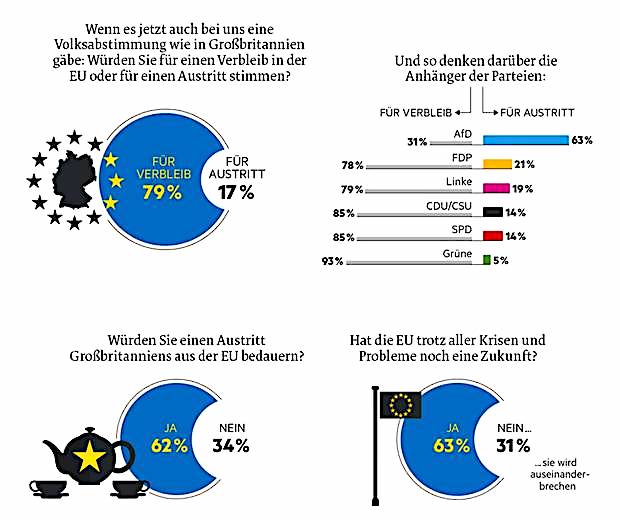
Europaabgeordnete zu Gast an der Landrat-Gruber-Schule?
Europa-Tag der Landrat-Gruber-Schule Dieburg am Freitag, 25.11.2016
Auch dieses Jahr hat die Landrat-Gruber-Schule wieder einen Europa-Tag geplant. Unser Europa-Abgeordneter Michael Gahler MdEP wird am 25. Nov. 2017 unsere Schule besuchen, um die Schülerinnen und Schülern aus drei Schulformen über verschiedene aktuelle Themen zu informieren und um mit ihnen zu diskutieren. So möchte die Landrat-Gruber-Schule ihren Schülerinnen und Schülern Europa und die EU näher bringen – für den europäischen Gedanken begeistern. Der Besuch von Herrn Gahler ist auch Bestandteil des Projektes YBRECA (Youth Bridges To Reach Efficient European Citizenship Awareness).
An diesem Projekt , von einer rumänischen Schule initiiert, nehmen neben Rumänien und der Landrat-Gruber-Schule für Deutschland noch die Länder Schweden, England, Griechenland, Italien und die Türkei teil. Dieses von der EU geförderte Projekt soll die Auseinandersetzung unserer jungen Menschen mit der EU und die Zusammenarbeit der o.g. Länder respektive der sieben aus ihnen teilnehmenden Schulen initiieren und unterstützen. Hierbei wählen die teilnehmenden Klassen selbst aktuelle, europäische Themen, planen Workshops und tauschen sich aus. Die Klassen der LGS Dieburg haben sich für die Themen Brexit, Refugees und Ukraine-Konflikt entschieden.
Besonders interessant und spannend dürfte das Thema Ukraine-Konflikt sein, da Herr Gahler gerade als OECD-Wahlbeobachter in der Ukraine unterwegs ist und hierüber an unserem Europa Tag berichten wird.
Christian Tschuschke, Koordinator Internationales

